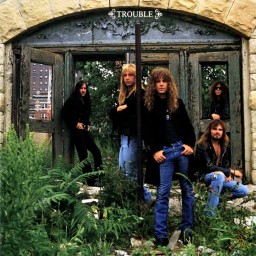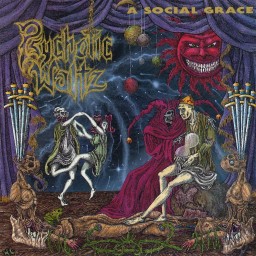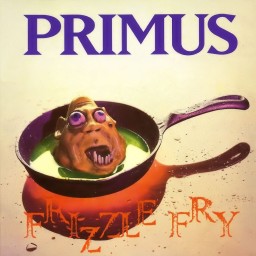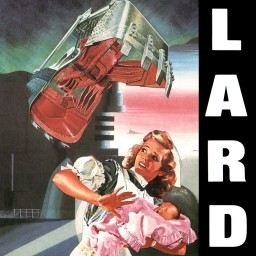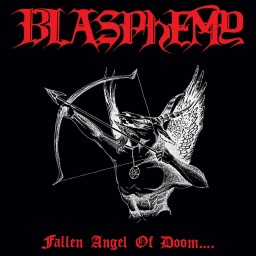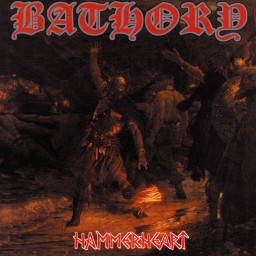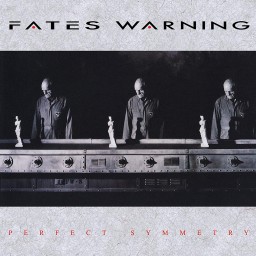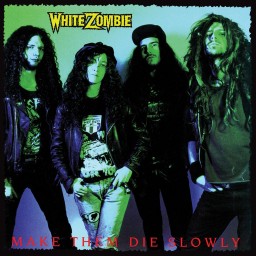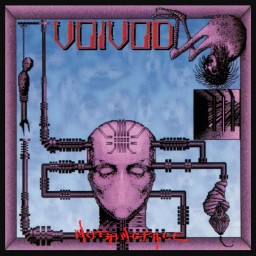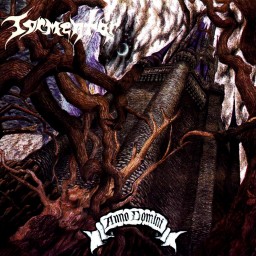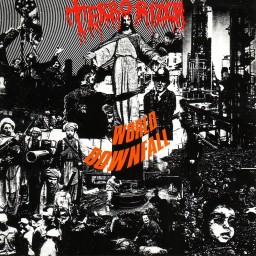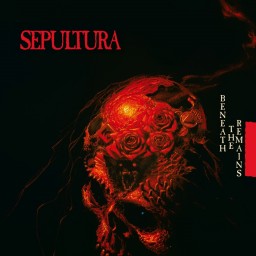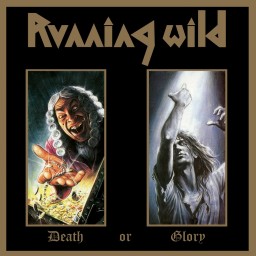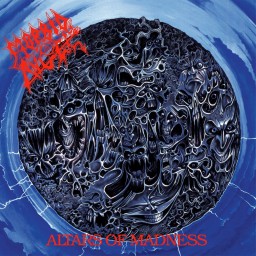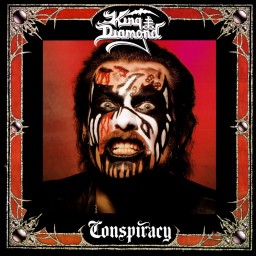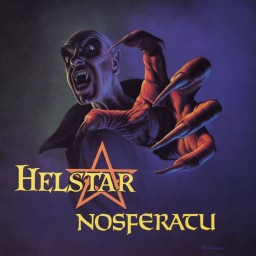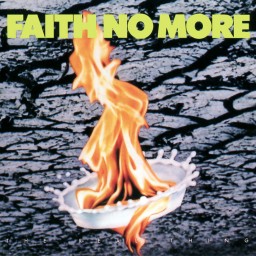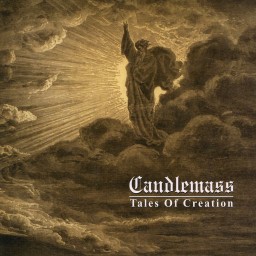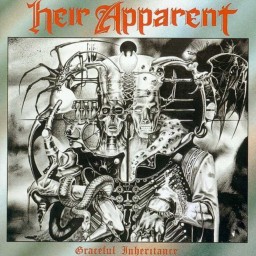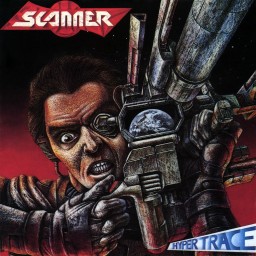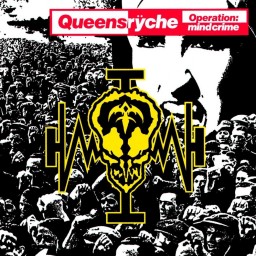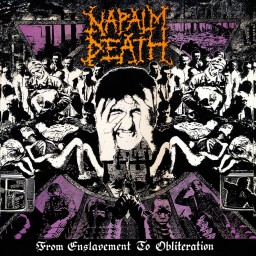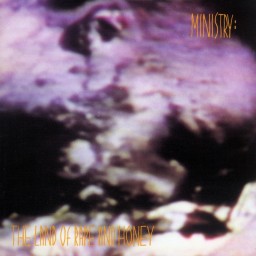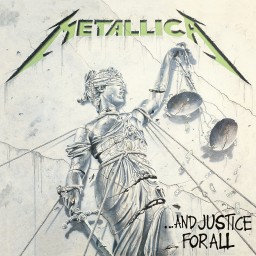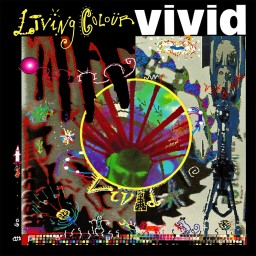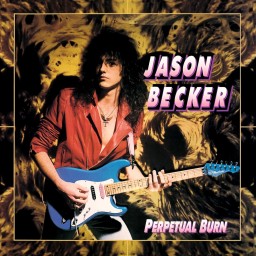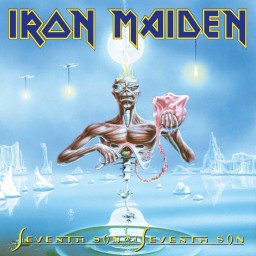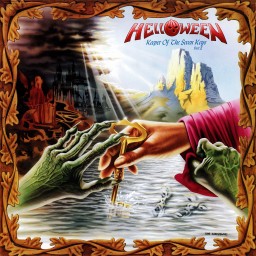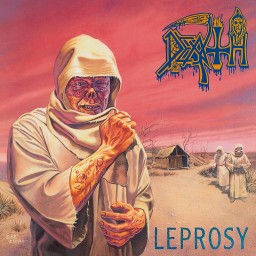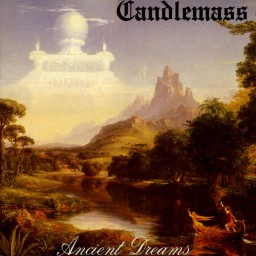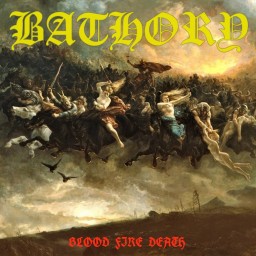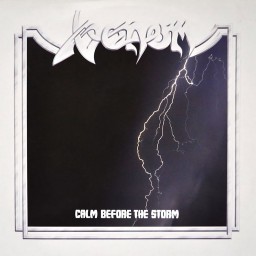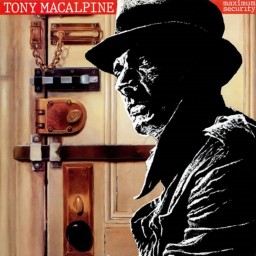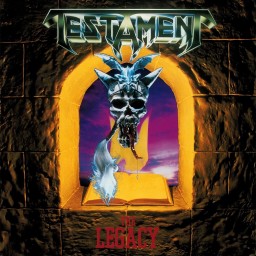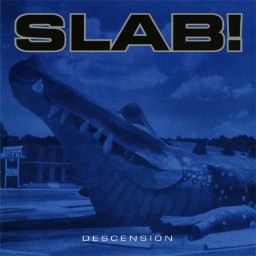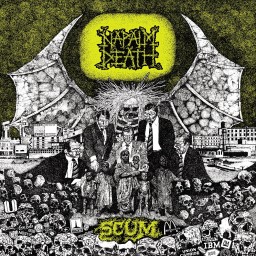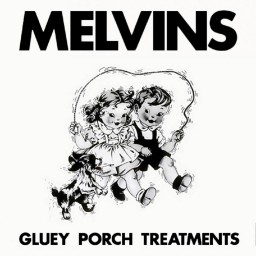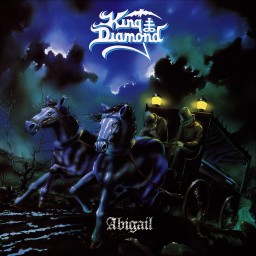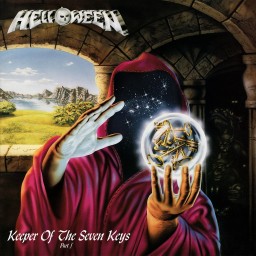SilentScream213's Reviews
Trouble’s self-titled is considered the band’s best work, but I consider it a large step back. To be clear, it’s still one of the best Trad Doom albums of its era, but that’s partly the problem. The Skull and Run to the Light were making bounds and leaps towards true Doom – the depressing, emotional atmosphere, the crushing riffs… They were certainly the closest the 80’s came to true Doom, and they were masterpieces.
Trouble is simply the band falling back into groovy Trad Doom territory. The progress of their last few albums is thrown aside in favor of a more “fun” traditional album. The songwriting is simplified, and there’s more focus on vocal melodies. Lyrics tend to be somber, but the delivery isn’t. In fact, it sounds like the band’s having a great time. Good for them, but I don’t want my Doom to sound like that!
All those gripes aside, I have to reiterate it’s probably the best pure Trad Doom put to record by the turn of the decade. Songs are interesting, varied, and fun. Eric Wagner sounds better than ever, though I prefer his more desperate delivery on earlier releases.
Genres: Heavy Metal
Format: Album
Year: 1990
The first real Metalcore album is, quite surprisingly to me, a fully mature and realized work of fantastic material. Usually when genres are just starting out, they go through a rough patch before hitting a sweet spot… not Rorschach. Rorschach aced the game day 1, and though the production is rough, the songwriting and musicianship are strong. Lyrically, Rorschach set the bar very high, and they take the conscious social lyrics of Hardcore Punk and give them a very dark, metallic edge that results in some seriously grim yet sharp writing.
The album is extremely short, and all the better for it. 12 tracks of dissonant aggression with simple but effective melodies is over in a flash with many songs under 2 minutes. Rorschach say an awful lot in that span, and leave an impact strong enough to birth a new genre, though they don’t seem to get this credit and remain strictly underground.
Genres: Metalcore
Format: Album
Year: 1990
Psychotic Waltz’ debut album A Social Grace is a high-quality Prog Metal affair with nice splashes of Power Metal and Heavy Metal, and an overlying fantasy/philosophical nature to it. The technique and songwriting are above average, with each musician having a good amount of precision and skill to show off. There are also a decent amount of simpler, beautiful segments and speedy aggressive parts that break things up nicely.
As far as Prog Metal goes, it’s pretty generic, which is a fair bet for anything this old, but everything is done well and there are no weak tracks barring the interlude. Nothing groundbreaking, no masterpiece, but a very fine cut of metal indeed.
Genres: Progressive Metal
Format: Album
Year: 1990
Primus help launch a new decade of metal with a release going against a lot of what 80’s metal was. Frizzle Fry was not exactly a parody album, but it combined silly and nonsensical themes, goofy vocals, and technical prowess.
Straight from your first glimpse of the cover, Frizzle Fry looks like an absolute joke. What you find inside is only halfway so, because in the songwriting and ability department, Primus take themselves very seriously. It’s no secret that it’d take a real expert to not only play, but come up with this stuff. There’s Math Rock and Experimental influence all over this thing. However, one thing Primus is not quite good at is writing a good riff, or a good guitar solo, or really anything musically memorable. The songs do their thing, dance around chaotically with some impressive technique and then leave nothing to remember them by.
The vocals, lyrics, and themes are a big weakness here for me. It’s all just too silly, never clever enough to make me laugh but annoying enough to take away from the music. The vocal style doesn’t make use of any nice hooks or melodies either, further instigating the issue of songs having no memorably strong moments.
Genres: Alternative Metal
Format: Album
Year: 1990
Oof, this one is really something. Lard, as you might suspect from the name, are a crazy, sarcastic, quirky, and humorously aggressive mess of a beast. Vocalist Jello offers manic, almost parody-like commentary on real life going-ons in a bizarre but endearing vocal delivery. The band is pretty great, and despite being repetitive and simple, they create some awesome beats and razor cutting riffs that you don’t mind hearing looped. The album is delicious in the same way an excessively greasy, heart attack inducing burger might be. And thus the name fits…
Unfortunately, there’s way too much time here devoted to gimmick songs (Literally half the record time) that it can’t be great. When they do straightforward rocking, it’s awesome. When they do avant-garde novelty stuff, it’s just… bad.
Genres: Industrial Metal
Format: Album
Year: 1990
Blasphemy released the first War Metal album in 1990 by mixing Black Metal’s thin production and dissonant riffing with mid tempo sections of meaty Death Metal and deeper growls akin to the later genre. Aside from the invention of a new subgenre, it’s really nothing special. The music is fine quality with some great riffs and impressive solos, the production is quite awful with drums obscuring most of it at times, and the whole package is relatively average.
It’s unfortunate how low the guitars are in the mix. I feel that with a better production job this album could be great, but the riffing here is about as audible as bass on a Grindcore album. An enjoyable album for a pure bestial mess of aggression, but no masterpiece.
Genres: Black Metal
Format: Album
Year: 1990
Bathory (Quorthon) is the type of band that is always innovating. They managed to invent 2 completely original styles of metal, Black Metal with 1984’s Bathory, and Viking Metal 6 years later on Hammerheart. They toyed with this style on 88’s Blood Fire Death, and finally the genre came into fruition here.
While this album is amazingly unique for its time, I do find a slight step down from Blood Fire Death, which is odd because the bookend Viking Metal tracks of that album were my favorite. It turns out, slower paced epic Viking Metal doesn’t feel as powerful without a ton of Blackened Thrash pummeling you in between. Hammerheart has some truly epic songs that amaze (One Rode to Asa Bay is a masterpiece) but the majority of the material doesn’t leave me in the same awe as say, Blood Fire Death or A Fine Day to Die. Since this album is much more uplifting and much less dark, the riffs aren’t really evil or sinister; rather, they are just there. In all honesty, I can’t remember any notable riffs off the album, as it puts much more emphasis on atmosphere and Quorthon’s vocals. The rhythm section is slow and monotonous, but it does create a martial mood befitting the themes.
Off of those notes though, this is still a fantastic album, and Quorthon’s vocals are actually quite awesome. He’s evolved from a pure Black Metal shriek to what sounds like a haggard yell very capable of hitting and holding notes, which was necessary to make the jump from Black to Viking Metal. The atmosphere is effective and the backing vocals provide a great sense of grandeur to the whole package. The songs individually are not always Bathory’s greatest, but the album as a whole works very well due to these connecting themes.
Genres: Viking Metal
Format: Album
Year: 1990
Most people consider “Awaken the Guardian” to be Fates Warning’s shining moment, but the album that outshone everything else by miles to me is “Perfect Symmetry.”
Perfect Symmetry is the band’s transition from a fantastical, proggy almost-Power Metal band into a full fledged modern Progressive Metal band, and one of the first albums ever to conceptualize this sound. Gone are the tales of high fantasy and abandoned are the speedy and uplifting metal epics that iconized their earlier sound. Here, they have traded their swords and steeds in acceptance of the reality that the world is a cold, unfriendly place that eats dreamers alive. They have become part of a machine of finely tuned skill and technicality – here the whole band play incredibly complex parts, alone but in unison, creating a cacophony of different melodies and rhythms that never play against each other.
One mistake you could make in reading that is to think they have become technical cogs incapable of producing melodies of beautiful passion. This couldn’t be further from the truth. Vocalist Ray Alder commands his voice like an instrument, but never shies away from simply crying out the sorrows of being smothered in the constraints of modern society. The lyrics across the board sound like those of a man who dreamed of grandeur as a child, but had those dreams quashed by reality. The only options are to hold out a last shred of hope that tomorrow holds something new, or allow oneself to die internally in order to carry on.
The music knows exactly when to dance the lines between progressive technical showcasing, soft passages of pure beauty, or simply catchy melodies. The band does include some strings on a few tracks that harken back to their fantasy sound (interestingly, it’s the least bleak songs with this touch). The titles might also fool you into thinking they’re still a fantasy band – tracks like “At Fate’s Hands” sound entirely medieval in nature. In reality, the song is about being helpless to make your own way in a world where people are smothered to fit roles and voices of the common are not heard. The burden of a modern society is disguised by poetic and timeless words that could apply just about anywhere if not for the context of the album.
It is a jarring shift from their old sound. It’s probably not what fans wanted. It’s also entirely pessimistic, introspective and subtly conscious. To me, it’s the perfect album from Fates Warning.
Genres: Progressive Metal
Format: Album
Year: 1989
White Zombie’s “Make Them Die Slowly” holds the title of best Groove Metal album of the 80’s… because it was the only Groove Metal album of the 80’s. Thrash and Alternative Metal undertones run through it, as does some Noise and Industrial influence. The music and production are both sub par, and the vocals range from tolerable to not so much. Every song is way too long for the amount of substance they offer. However, they do get some credit in that when the songs kick into faster and heavier territory, they are actually pretty damn good. Rob’s vocals play into this as well, as he’s much better when yelling angrily than trying to sing or do whatever else.
Well, that’s just the Thrash influence talking. The majority of this album is sub-par Groove. Probably influential, and still manages to be somewhat unique, but that doesn’t make it great.
Genres: Groove Metal
Format: Album
Year: 1989
As someone who much prefers Voivod’s true Thrash days, this is a hard album for me to rate. What Voivod were doing in their career with this and their previous album was pretty much unprecedented. No one had really combined Tech Thrash Prog Metal with weirdo avant-garde intricacies yet. Hell, there were barely any normal Prog Metal bands at the time. Voivod were already living in the 2000’s by the time they recorded Nothingface.
And yes, it is as interesting as it’s made out to be. Everything about it is odd in a very well done and endearing way. Never too odd to make it unapproachable (it was actually by far their catchiest album upon release) but always packing enough surprises to keep in interesting. The songs stand out with memorable riffs and some surprisingly catchy hooks, but they are all so odd that you never really get them memorized. There’s always something new to catch.
The weaknesses here are that there are a lot of start-stop tactics that just fracture the listening experience. They seem to change tempos and rhythms with the purpose of jolting you. Since they go for a much more melodic sound here, it’s really not enjoyable to be jolted and thrown when getting into some of the fantastic melodies and rhythms they lay down. Missing Sequences is a prime example of this; most of the song features speedy drumming and some of their best lead guitarwork to date, with some fantastic harmonized riffs. And then there are segments where everything just stops, ripping you from the trance they had crafted. Maybe to some this is an extra interest factor, but it takes away a lot for me.
Snake is also much better at doing harsh yells than singing. Another point their true Thrash days have over this.
Genres: Progressive Metal
Format: Album
Year: 1989
Tormentor’s first release, despite being just as evil and disturbing as anything Bathory ever did, had a much larger focus on melody and conscious atmospherics (opposed to “atmosphere” via poor production). However, it was still rather weak despite these innovations, and also suffered from horrendous production.
Their next release, Anno Domini, still has an awful production job, but everything else about it is top notch. The riffs vary between shredding, buzzsaw Thrash and Black Metal leads almost melodic enough to be considered Melodic Black Metal. A couple songs make use of minimal keys and other atmospherics, and the vocalist does an amazing job snarling and screaming, but also enunciating very well despite his heavy accent. The musicianship is messy at times, but despite their limitations they are clearly pushing themselves to their total limit, churning out some really speedy and impressive stuff even if it kills them. With good production, this would be a flawless first wave Black Metal release, but the garbage sound drags it down.
Genres: Black Metal Thrash Metal
Format: Album
Year: 1989
World Downfall is by far my favorite Grindcore album of the 80’s. It’s become really clear to me why most Grindcore doesn’t do it for me while Terrorizer kicks ass.
1. I don’t like silly/humorous music, which a fair portion of Grindcore is. This means lyrically and sonically – Terrorizer is full of hardcore riffs and angry, pessimistic messages that mesh well with the chaotic, manic wall of aggression.
2. Unlike most Punk genres, if you want to play Grindcore, you have to know how to play your instruments… Doing everything as fast as physically possible without having some amazing technique and precision just sounds awful. Terrorizer is full of extreme talent and capability. They nail everything they aim for and always sound precise (save the vocalist… more on that later).
3. If you want to play Grindcore, you need decent production. If you’re just going hard on every instrument as aggressively as possible, and you don’t have some sort of production job that can individualize those instruments, it just sounds like noise. World Downfall has some very good production without compromising the grit or making it sound clean. There is no sheen to it; simply a very good job of making sure every awesome riff is still audible over those pounding drums, and the bass gets some great treatment too.
There is one huge weakness here, else it would be a near perfect grind record. The vocalist.
I know what people say, “you don’t listen to extreme music for the vocals! It’s for the riffs!” Never for a second have I felt that way, and never have I understood it. If vocals are present, they matter, and if lyrics are present, they matter. They are pieces of the art that forms the whole.
The vocalist here doesn’t have a bad sound, and the lyrics are fine. The written lyrics are fine. The words that come out of the vocalist’s mouth hit about 50% of what’s written, 40% of the time shout random words or syllables that are not understandable, and 10% of the time completely skips a verse or chorus and says absolutely nothing. There are no full sentences or lines, at best a few of the words are launched out, sometimes not even in order. It’s like the vocalist had never seen the lyrics before, they just gave him a paper while they jammed and he decided to wing it.
Imagine if any other band member did that with their instrument. The album would sound like absolute crap. Why do vocalists get a pass? Not from me. Really drags down an otherwise top-notch grind album.
Genres: Grindcore
Format: Album
Year: 1989
Sepultura was already delivering top tier riffs on their sophomore Schizophrenia, but unfortunately that album was plagued by awful production. Max’s English wasn’t great either, resulting in some awkward delivery in some places. Here, Sepultura finally get to solid ground and bring all of the strengths they already had to a more professional release. The production here isn’t anything to write home about, but it’s leagues better than what they were working with before. The monstrous riffs are back, but the rhythm section opts to change things up here and there. Instead of nonstop Thrash beats, there are slower and more technical moments, hints of their future Groove sound, yet they never steep into boring or repetitive territory.
Beneath the Remains doesn’t sound too different from other Death tinged Thrash of the late 80’s, but Sepultura start to add a political, conscious message here that sets them apart from the Satanic imagery of other bands. Max finally gets his voice down and writes some good lyrics here. A prime example of the heavier end of Thrash, and one of the finest albums released at the end of the decade.
Genres: Thrash Metal
Format: Album
Year: 1989
Running Wild are one of the earliest Power Metal bands around, starting as Speed/Heavy Metal but moving closer to true Power Metal by the end of the 80’s. With each release, they sailed further from mediocracy to uniquely speedy melodic pirate metal with delicious riffs and gruff but talented vocals. Death or Glory is the peak of their 80’s material and often cited as their magnum opus.
The opening track “Riding the Storm” is indeed possibly the finest Power Metal song that had been laid to record by 1989. The guitar leads weave melodic, infectious riffs around a constantly pummeling rhythm section that keeps the song at full energy the whole ride through. The vocal performance is just awesome. Never a dull moment in the epic rocking of over 6 minutes. The title track “Death or Glory” captures this in a similar vein. Though much shorter, the atmosphere is just as epic and powerful, and that chorus stands against the best. Two prime examples of what a perfect Power Metal song should be.
Unfortunately, while the rest of album is great, there’s nothing else that can really hold its own against the aforementioned tracks. It mostly just blends together as strong but unmemorable material. It’s also a bit of a problem when the album starts on its highest note and ends on its lowest (the slower “March On” leaves a bit to be desired and sounds like an arena rocker). Truly, Running Wild wrote some of the best Power Metal songs of all time, but Death or Glory as an album doesn’t quite match such standards.
Genres: Heavy Metal Power Metal
Format: Album
Year: 1989
Since its inception in the late 80’s, Death Metal has become one of the most adaptive and varied subgenres of Metal. The vast amount of styles and incorporations added to it are nothing short of amazing for what was originally a very strict and niche genre. I personally am a huge fan of everything the genre became and what was done with it, and what’s still being done and changed. But sometimes, there’s nothing better than some gold old fashioned honest to Satan Death Metal.
Altars of Madness is Death Metal perfected in its purest form. Every song just consists of masterful playing on every front, and only the very best of evil dissonant riffs shredding one after another. Songwriting and song structures are far from simple, adding in loads of substance between the all-out blast beat riffing. The vocals are some of the best in OSDM, very intelligible growls with decent lyrical writing to back them up.
There’s not much else to say about this beast. Pure Death Metal incarnate.
Genres: Death Metal
Format: Album
Year: 1989
Conspiracy is King Diamond’s 4th album, 3rd concept album and 2nd album in the “THEM” storyline. So far, King Diamond has been one of the most consistent bands around, delivering albums full of great material, all with a similar “evil” Heavy Metal sound with tons of Prog Metal and theatrical sensibilities. This album is no different, but I do consider it slightly stronger than the prequel musically. I’ll also say King Diamond’s vocals sound better than ever here. I’ve never been a fan of his high pitched falsetto, but he’s really got harmonizing down here, layering himself many times over to create some really amazing vocal melodies.
The story manages to stay entirely entertaining and interesting despite being a direct sequel to what seemed like a finished tale on “Them”. The familiar characters return and it’s great fun to see what happens to them after the events of the first chapter. King remains a fantastic storyteller and clearly loves getting into theatrical ham mode as he leads every song with charisma.
Musically it remains top tier Heavy Metal, each song delivering many classic riffs, and the keys and rhythm section all play lead as well, supporting the guitars and vocals but ever changing. The music is always dark and moody, the lead guitars especially sounding closer to Thrash at times. Some of the best of the genre here.
Genres: Heavy Metal
Format: Album
Year: 1989
Considered by most to be their magnum opus, Nosferatu saw Helstar reach the peak of their songwriting skill before entering hiatus. With each prior album, they upted the ante in delivering technical, progressive, neoclassical thrashy Speed Metal. They even opted to make the first half of this album a concept story based on Dracula. Truly, they did pull all the stops for what was for a time their swansong album.
Helstar started out as a ridiculously generic Heavy Metal band with their debut album Burning Star, which makes the transition to this completely unique entity even more astounding. Even Today, Nosferatu holds its own as a monstrous testament to musical prowess and songwriting in Speed Metal. Interestingly, it walks a fine line between the heavy aggression of Tech Thrash and the hyper melodic sensibilities of Power and Neoclassical Metal. The vocalist adopts more of the later style, opting for dramatic flair and melody instead of aggression.
The album falls flat sometimes in delivering a whole lot of emotion, but they still do better than most neoclassical bands. The riffs are really sick too, not just pure wankery. Though there is a lot of that as well. Rhythm section is amazing.
Genres: Heavy Metal Power Metal Speed Metal
Format: Album
Year: 1989
Faith No More make a bit of a leap on this one. They keep their weirdo funky Alt Metal sound and knack for variety and experimentation, and slap a heavy dose of consistency on top. Before, Faith No More produced about as many good songs as total duds in their search for a sound. Here they continue changing things up, but the quality remains very good across the entire album. The keys do a fantastic job of adding some grandeur to the otherwise very generic instrumentation. The vocals are hit or miss, not really my thing, but pretty unique at the time and employ a wide variety of techniques. Overall a great improvement without straying from their roots.
Genres: Alternative Metal
Format: Album
Year: 1989
Tales of Creation is the last of Candlemass’ original golden era of albums, and what a fine way to conclude Messiah’s (first) run with the band. The album is a concept album of sorts, focusing on creation, loneliness, introspection and self-love. It may not have a direct overarching story, but there are call-back moments throughout that connect the dots.
Musically, it sounds rather identical to the previous two albums. Every song is strong, aside from the short segues there are no weak moments. Messiah’s voice is in top form, and Leif’s slow, melodic yet sludgy riffs are on point. You can’t expect anything new here, but you can expect another top notch Candlemass album.
Genres: Doom Metal
Format: Album
Year: 1989
A mesmerizing album crafted with intense care and attention to detail. Every single instrument is easily audible, and each are following their own patterns, adding to the main mix without trailing mindlessly behind a set melody or rhythm. While the music isn’t incredibly technical, it is definitely rather progressive, and include a lot of changing qualities that sustain interest throughout the 13 track album (that was A LOT of songs for a metal band in ’86.)
I don’t agree with the Power Metal label on this one, as only the speedy Nightmare has the chops to back that title up. However, it’s very evident this album fosters a genuine medieval feel to it, from the lush but cheesy keys down to the slow gallop riffs that certainly would be Power Metal if played at double speed. It’s amazing how melodic this album is, and sounds a lot like what Savatage would later become (Savatage themselves popularized the whole piano and operatic elements in metal, but these guys were doing it way earlier!).
Overall, a fantastically complete package with no weak points, plenty of variety and precise craftsmanship.
Genres: Heavy Metal
Format: Album
Year: 1986
There are a couple metal albums that got the sci-fi label in the 80’s simply for having one song about space (or god forbid, featuring a cyborg on the cover), but Scanner’s Hypertrace is the first true sci-fi metal album. Every song here follows the theme, and the music is melodic and speedy, very fitting for laser space battles. The sci-fi theme does give them a bit of a niche, but even that aside, the music here is fantastic, each song delivering great riffs and infectious choruses. Despite the fun fantasy nature of it, there are themes of revenge, hatred, and extermination throughout that can actually be taken rather seriously.
Consistency is key here, as not only is everything laden with sci-fi themes, but each song is great, despite varying enough in sound, speed and structure to keep everything from sounding too samey. A very well-done debut.
Genres: Power Metal
Format: Album
Year: 1988
I remember… My first expectations of this album, before having heard anything, were that I wouldn’t love it, or at least, not as much as Rage for Order. The reasoning is simple; I loved Rage for Order because despite being an 80’s Prog Metal album, it was built on incredibly emotive songs centering on the passionate vocals of Geoff Tate. The music was awesome, but the song structures were very straightforward and filled with explosive, anthemic choruses, and so it served the mood and the song rather than showing off technical prowess or wankery.
There are two reasons I was afraid this might change on Operation: Mindcrime. Firstly is the fact that it’s much more readily labeled Progressive Metal, while Rage for Order seems to be considered more (un)traditional Heavy Metal with some prog elements, so I was afraid the songs might leave their simple yet catchy structures behind in favor of showing off how good they are. Secondly, I was fairly certain the album was politically based. I don’t dislike political lyrics, but the problem is, I like music that makes me feel something. Political lyrics don’t make me feel anything (other than frustration, either because the message is sadly true, or because it isn’t true at all). I can appreciate sharp political commentary, but I can’t fall in love with it or feel my chest tighten due to it. I feared Queensryche would abandon their emotive cheese in favor of a more educated and sophisticated lyrical direction.
I was so wrong.
YES this album is centered around politics and social issues, and it nails them unabashedly with an unforgiving edge, taking hits at capitalism, religion, the culture of pay offs and the tyranny of the one percent in America. But the album is not politically driven. It is character driven, and that is why it succeeds in terms of both storytelling and delivering powerful, emotive songs. Without spoiling anything major, the album is a very clear conceptual story of a man who becomes disillusioned with American society (highlighting the political and social issues). He ends up joining an underground revolution, experiencing crime, addiction, love, loss, insanity, and making all these things extremely personal (this is how the album holds you and doesn’t let go). Lyrically, it remains incredibly passionate and evocative, a fantastically emotional tale that takes stabs at the big evils but never lets you forget about the individuals and their important experience.
Musically, they sacrificed absolutely nothing. The songs are still very catchy and hell-bent on creating melodies that will kick your ass, make your heart ache, or at the very least ingrain themselves in your head forever. And once again, Geoff Tate’s vocals steal the show. The amount of harmonizing he does with himself here is insane, with just about every song featuring a chorus that could go down on any all time best vocal lines ever laid down. His voice is crystal clear, he enunciates well so following the story is easy, and his range is killer. The production for everything sounds amazing, especially standing out as an 80’s album that hasn’t aged a bit.
Another thing? There are no flaws. Not every song is perfect, but they are never doing anything wrong. Nothing remotely mediocre on this 15 track epic. Even the segues are cool, providing key story bits and often having some killer music to them, which is usually where concept albums can fall apart. One of the greatest albums of all time.
Genres: Heavy Metal Progressive Metal
Format: Album
Year: 1988
22 songs that are so heavy you can’t even hear the riffs. The lyrics are quite good but you can’t hear those either. The most abrasive thing around in 1988.
Genres: Grindcore
Format: Album
Year: 1988
The album starts off quite energetically, with some simple yet aggressive and heavy riffs and some artificial but effective beats with some nice double bass work giving it some extra power. After the first couple of songs, it shifts more towards Electro-Industrial territory and loses its metallic edge. It also slows down considerably, and relies on sampling to break its simple, repetitive beats. Most of the non-musical noises thrown in add little to the sound and are usually just abrasive for the sake of being abrasive. The instrumental tracks are especially hard to bear, as Al’s manic, crazed vocals are one of the main appeals to the album.
An incredibly unique record when it was first conceived, and highly influential to Industrial Metal and other similar circles of music. Today, it is too simple and limited without offering any staying power to hold up very well.
Genres: Industrial Metal
Format: Album
Year: 1988
Metallica enter a slight stylistic shift towards the progressive, slowing down a bit and delivering more complex, technical rhythms. This is actually quite possibly their least accessible album, not only lacking any sort of anthemic rockers, but also being pretty much a downer in mood the whole time. In addition, it tends to focus more on technicality and rhythm instead of instantly memorable riffs. That’s not to say the music here is really complex, but certainly more so than previous albums.
From that, you can pretty much tell what the strengths and weaknesses are. Here is Metallica at their darkest, most technically proficient, and most serious. It’s definitely got more points in terms of “thinking man’s music” than their other stuff, but on the other end, it definitely loses memorability. The songs are all quality, but most of them lack any insanely good riffs that get caught in your head. It’s also supposed to be their angriest album, but since the straightforward aggression is swapped for rhythmic precision, it certainly comes off as less passionate, and James is yelling in time more than he is in melody. This unfortunately sacrifices mood, which leaves songs a bit flat.
Now, there are two songs here that completely evade those weaknesses. “One”, as everyone knows, is an incredibly powerful “ballad” that basically goes through stages of grief, starting slow and somber before breaking out into manic frustration. Then there’s the closer, “Dyer’s Eve.” It’s possibly Metallica’s heaviest, angriest song ever recorded, detailing child abuse and showcasing Lar’s best performance yet. This song is so strong because James sounds very convincingly full of anger and hurt, and everyone is playing at the apex of their ability.
It’s certainly a “different” album even considering Metallica’s varied discography, but it was very much a success and resulted in some of their best material.
Genres: Thrash Metal
Format: Album
Year: 1988
Living Colour emerged with a highly original sound and conscious, politically charged lyrics that as of then had not been prominent in Metal. Simple yet extremely catchy and funky riffage carries the somewhat repetitive songs along as Glover’s fantastic voice and words drive them home. The subject matter ranges from razor sharp critiques of social injustice to introspective, passionate longing, all done very effectively. The album is rather eclectic, and the band showcases their ability to shift between hard hitting Metal anthems and slow, funky bluesy numbers, touching on numerous styles in between.
Vivid is effectively one of the first Funk Metal albums ever recorded, with only Faith No More’s Introduce Yourself coming earlier, though this album is a more fully realized representation of the genre.
Genres: Alternative Metal
Format: Album
Year: 1988
Jason Becker, to me, is actually the least appealing of the many Neoclassical guitar heroes of the 80’s. He is arguably the most talented guitar player, but when it comes to songwriting, or playing anything memorable, or evocative, he doesn’t do it for me. There’s also the backing band – or lack thereof. Unlike some shredders like David Chastain who love giving their highly capable backing band moments to shine, this is just Becker, basically soloing for 40 minutes over very simple and repetitive backing music. His skill is incredible yes, but it’s basically a gimmick album at this point. The only appeal is that this guy plays so amazingly fast it might distract you from the fact that nothing else is going on.
Genres: Neoclassical Metal Progressive Metal
Format: Album
Year: 1988
Another Maiden record and another set of fantastically composed pure Heavy Metal tracks. Maiden continue to retain a very signature sound all while laying down tracks that don’t sound like anything they’ve done. This is probably their most melodic album yet, and most accessible in a way – it’s almost pure fun all the way through. The opener “Moonchild” is full of catchy riffage and anthemic vocals, “Can I Play with Madness” almost sounds like a pop song, and even the epic “Seventh Son of a Seventh Son,” at almost 10 minutes, goes by in a flash thanks to its ever changing yet never boring structure. “The Evil That Men Do” and “Only the Good Die Young” also feature some of my favorite lyrics from Bruce and provide some dark, moody atmospheres contrary to the rest of the album.
The record is pretty much exactly what anyone can expect from Maiden, while at the same time continuing to surprise with the band’s songwriting abilities. All songs are great and full of memorable qualities.
Genres: Heavy Metal
Format: Album
Year: 1988
Although the name is misleading, this album and part 1 are not two-part concept albums, and actually seem to be completely unrelated in terms of themes. This album, in my opinion, is superior and much better represents the genre of Power Metal.
While Part 1 abandoned the band’s Speed Metal energy and aggression in favor of complete melody, this album brings back the intense speed of the debut while retaining extremely melodic and uplifting songwriting, resulting in a concrete example of fully formed Power Metal. This album, like Part 1, is incredibly diverse, both in terms of themes and songwriting, with incredibly poppy numbers sitting between hyper speedy power assaults. Thankfully this album is much more consistent quality-wise, apart from the silly Dr. Stein every song is very strong.
Another note – they really went off the wall stylistically here. The lyrics are insane as are some of the sounds they throw in. It’s kind of off putting at times, but on the other hand it’s one of the most fun-sounding records I’ve ever heard. Definitely one of the first and best examples of metal not being dark in any sense.
Genres: Power Metal
Format: Album
Year: 1988
Death’s debut album was a very traditional and straightforward Death Metal release. There’s absolutely no shame in that, and since it was one of the first Death Metal albums ever, it was innovative despite being as straightforward as Death Metal goes. However, Chuck upped the ante on their sophomore Leprosy by adding a good amount of technicality and progressive elements to the songwriting. The lyrics are also better than the juvenile rubbish on the debut; still death and violence, but written much more effectively. Much like Ride the Lightning was to Kill ‘Em All, the songs here are much more mature and developed, each offering multiple passages, wild solos and a huge number of massive riffs. It’s also very consistent; some songs lean more towards the new technical direction than others, but every track is a killer.
It’s still classic OSDM most of the time, but the songwriting techniques in such an early stage for the genre are what laid the groundwork for Tech Death and Prog Death. This band was one of the first on the scene of Death Metal, but instead of remaining stagnant in that position, they continue to innovate and evolve the scene further.
Genres: Death Metal
Format: Album
Year: 1988
Candlemass deliver the same kind of quality, riff-driven epic Trad Doom as always. Again with Messiah’s intense vocal prowess, the album retains the sound from Nightfall. Ancient Dreams tends to be seen as a drop in quality, but I instead see it as a trade off of sorts. There is no doubt that Ancient Dreams fails to deliver the same highs as Nightfall; however, it also does away with any sort of filler material, which dragged Nightfall down a bit. What remains is an extremely consistent album where every song is of equal quality – an odd exception being the title track, who’s riffs are just odd, and Messiah’s vocals don’t really play off them well.
All in all, another high quality Trad Doom album that should be given the same respect as the rest of Candlemass’ first four albums.
Genres: Doom Metal
Format: Album
Year: 1988
Blood Fire Death marks one of the most clear improvements in a band I’ve seen. Bathory’s first album spawned true first wave Black Metal, and the two that followed delivered more quality yet samey material. All were very consistent packages of thrashy Black Metal with amateurish musicianship, horrible production and yet some sort of incredibly alluring interest factor that made it all sound right. On Blood Fire Death, Bathory opted to stop delivering more of the same and put the bar way higher.
Here, they abandon all their weaknesses. The music, while still simple oftentimes, is played fast and sharp; gone are the messy notes and offbeat drums, and in addition there are moments of great skill displayed as well. More importantly, the band continues to focus on mood and use their greater skill to craft awesomely aggressive and sinister soundscapes rather than showing off. The production is also much better here, and somehow they manage to hit a fantastic sweet spot between keeping the raw grit of true Black Metal and keeping all the instruments audible and sounding great. The riffs switch between moody Black and aggressive Thrash riffing and both play off each other perfectly, and despite liking previous Bathory albums, I find the riffs here to be all around much better and more memorable, maybe no small thanks to the guitars being clearly audible.
The band also capitalizes on their strengths. I said their previous albums were consistently good yet samey; this album delivers 7 consistently amazing songs that all have very distinct sounds to them. Opting for a more epic sound (but no less evil and thankfully no less serious), the band adds some keys and synths (usually choirs) here and there, and it works fantastically. They never overdo it, adding just enough to accentuate the songs and add to the individuality of each composition. The obviously synthed sounds might sound cheesy in other cases, but here the synths being not so high quality actually matches the raw mixing and ends up creating this sound that is just somehow off in the best way.
The last thing I’ll say is Quarthon finally perfected his voice. My god that hollow, raspy call is amazing. He even manages to add a lot of variety to the way he screams, switching it up to serve each song individually, and adding a ton of passion to it when he tries. Simply one of the best voices I’ve heard in metal. The lyrics are great too, ranging from the first signs of the Viking themes, to old school Satanic madness, all with peak delivery.
Genres: Black Metal
Format: Album
Year: 1988
There is a certain level of songwriting ability and production quality that Venom never had that prevent their albums from being true masterpieces, and put a real threshold on all their material. Despite that - and despite the very low ratings for this album - I find this their best, most consistent release.
I can understand the low votes, as Venom basically threw away their cult icon status to release much more commercially viable material, but anyone not concerned with status should be able to see this album has some very strong riffs and their best musicianship to date. They also added in some catchy vocal melodies for good measure. All the songs bar "Muscle" are great, sound unique (something Venom has never done) and offer a different side of the band that I think they excel at. There's nothing technical or groundbreaking here, but it's a great joy to listen to front to back, something I can't say even about Venom's great early material.
Genres: Heavy Metal
Format: Album
Year: 1987
As per MacAlpine’s usual style, Maximum Security is a classy, lush guitar hero album that showcases a lot more than pure speed or technical proficiency (though MacAlpine has those in spades). Great attention is paid to the songwriting and atmosphere here, with keys playing a very prominent role. They switch between dueling with lead guitar melodies and adding thoughtful ambiance to back it. Not much needs to be said about the guitar work itself, which is mostly top tier quality if a bit generic as far as guitar heroes go. Every song (save the short piano solo) is very strong, and most even manage to be memorable in their guitar hooks, which is a hard feet in instrumental metal.
Genres: Neoclassical Metal
Format: Album
Year: 1987
Take run of the mill 80’s Thrash and then take away pretty much any weaknesses you could find in the genre. That’s really Testament’s debut, which added absolutely nothing new to the realm of Thrash, but did everything just about as well as anyone could have. Crunchy riffs, wild solos, and a precise, speedy rhythm section played some of the tightest standard Thrash put to record. Every single song is top quality.
The most interesting factor about this album is actually Chuck’s vocals, which have surprising versatility especially for a Thrash vocalist. He can yell with the best, but he can also shift his pitch quite a bit, and carry melodies when he has to, and even throws in a couple death growls for good measure. The production is also as good as 80’s metal got, which is especially surprising for a debut. They didn’t invent anything new here, but at step one they had already mastered the craft.
Genres: Thrash Metal
Format: Album
Year: 1987
The first documented Industrial Metal album of all time comes from unknown UK band Slab!. It’s surprisingly eclectic, though that unfortunately means only a couple tracks are actual Industrial Metal, while others are various combinations of Industrial music with Jazz, Funk, and Rock.
Very experimental and noisy, it doesn’t lack innovation, but the ideas present here are very primitive. None of the songs contain any staying power, as the riffs are simple, the choruses are weak, and there’s not enough atmosphere or neat instrumentation to make up for those. They could have been something great if they honed these skills and went further, but unfortunately their story pretty much stopped here. Still hugely significant to Industrial Metal.
Genres: Industrial Metal
Format: Album
Year: 1987
People define the word “heavy” in different ways, but if you want to define it as “playing as fast and as dissonantly as possible” than Scum was the heaviest album in the world when it came out, inventing a new genre so abrasive it couldn’t fit into Hardcore Punk nor Death Metal. Grindcore is, at its core, just taking music extremities to 11 at all costs, and Scum was the first Grindcore album. This record is therein about 28 minutes of 28 songs of that; no more, no less. Nothing else to say.
Genres: Grindcore
Format: Album
Year: 1987
A milestone release, as there have been a couple very sludgy albums prior to this one (namely the B side of My War, Black Dust and Gore’s catalogue) but this is probably the first fully formed Sludge Metal album. It’s a disgustingly heavy, ploddingly aggressive mess, the kind that would have easily freaked people out back in the 80’s. Melvins basically take the aggression and anger of Hardcore Punk and slow it way down, adding in a bit of experimental elements and metallic sheen and go at it. For such slow music, a ton of tracks are incredibly short (there’s that punk influence) and despite there being 18 of them, the whole thing is very consistent.
The kind of album where you either love it all the way through, or it doesn’t do anything for you. I appreciate what they were doing here, but early Sludge Metal just doesn’t have enough going on for me. Without memorable riffs, Sludge tends to rely on atmosphere and delivery, but neither had been developed in the genre at this point, so the release falls flat on my ears.
Genres: Sludge Metal
Format: Album
Year: 1987
King Diamond – the band named after the man – are a group which will always be synonymous with the leader’s very unique vocal style of high pitched falsetto singing. This will either be a factor of great enjoyment, or something one will have to learn to tolerate. I unfortunately am in the later category; King Diamond’s vocal style is not something I enjoy, but he definitely brings intense talent to the band in terms of songwriting, and his deeper vocals are actually quite good.
That there is the only “weakness” with this album, which most consider the band’s magnum opus. I will not spend too much time applauding the musicianship, despite it all being fantastic. Every instrument is audible, technical, and serve the songs individually and as a group; the sound is classic Mercyful Fate/King Diamond stuff, with a bit more melody, emotion, and progressive elements. That alone would be enough to solidify its place in the best of metal, but there’s much more to this album.
One of if not the first full metal concept albums that follows a concise story, Abigail is not only an instrumental masterpiece, but a literary one as well. The story is engaging and fits the music perfectly. As always King Diamond delve into the occult, with a ghost story of possession. However, what makes this story so effective is not only does it merge with the evil riffing of the band, but there is also a deep sense of tragedy to it, loss and vengeance as well, and these emotions are all captured musically and literately as well. For this reason, I applaud King Diamond as a fantastic band leader despite his vocals not agreeing with me, as he crafted one of the greatest concept albums of all time.
Genres: Heavy Metal
Format: Album
Year: 1987
Kind of mixing their first album and Fates Warning’s output, Helloween play fast, technical and progressive music here, but also make room for softer, catchier numbers. The aggression of their debut has been traded in for uplifting triumph. The album is a very eclectic package despite only having 6 full songs, and one would not want for variety here. The problem there is that the material is not very consistent, with their highs being fantastic and the lows just okay. The new vocalist is a welcome addition, but even he has some pitchy moments and questionable vocal melodies between the usually solid performance.
The track “Halloween” is actually a talking point in itself, being one of the most progressive epics in all of Metal at the time. At over 13 minutes, the song shifts through so many movements, it’s about as eclectic as the rest of the album. The difference here is that the track is very consistent throughout, full of the band’s best riffs and greatest vocal performance on the album. Really, there couldn’t be a better way to sing about Halloween.
Genres: Power Metal
Format: Album
Year: 1987










